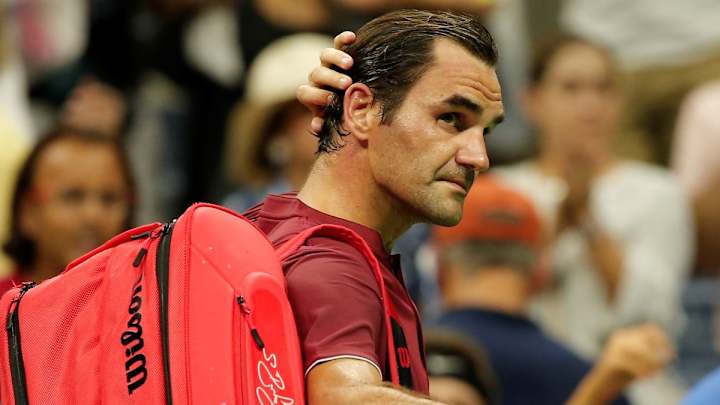Roger Federer's Loss at the U.S. Open Was a Sharp Reminder of the Tyranny of Time

NEW YORK — Because there’s no clock in tennis, we often forget about the tyranny of time. Last night at the U.S. Open, we got a sharp reminder. In stifling humidity—the U.S. Open turned U.S. Oven—Roger Federer, at age 37, melted away, falling to an athletic Australian, John Millman, 3-6, 7-5, 7-6, 7-6, in the fourth round.
This marked Federer’s earliest U.S. Open defeat in a half-decade. It thwarted his bid to win this event for a record sixth time. It precluded the much-anticipated (if not outright assumed) dream quarterfinal against Novak Djokovic. It foreclosed the possibility of the first Federer-Nadal match at the U.S. Open.
Even a player of Federer’s unrivaled greatness loses at majors more often than he leaves with the trophy. So let’s go easy on the career memorials and existential questions.
Still, this was a different kind loss. Federer did something we rarely see him do on a tennis court: sweat. Dripping in the humidity, he looked visibly uncomfortable. He admitted to as much afterward. “I just thought it was very hot tonight. Was just one of those nights where I guess I felt I couldn't get air. There was no circulation at all. I don't know, for some reason I just struggled in the conditions tonight. It's one of the first times it's happened to me.”
U.S. Open Midterm Grades: Serena, Rafa, Federer Get High Marks
As his energy declined, so did his accuracy. The stat sheet reads like a noir script. Federer put fewer than half his first serves in play and was beaten off the ground, committing a ghastly 77 unforced errors in the three and a half hours he was on court.
Pause here to acknowledge Millman, a genial 29-year-old Aussie whose career has been riddled with injuries. He entered the tournament with a match record of 14-15 for the year, with a season goal of cracking the top 50. Last night, he nailed his audition. Athletic and fit, he stayed in rallies and defended as well as he offended. He—not the guy who has won 20 Slams—played best when it mattered most. His unforced error count? A parsimonious 28. It’s thus no coincidence that he walked off with the biggest win of his career.
Millman’s game was no revelation to Federer. In fact, Federer has often summoned Millman as a sparring partner. It’s fair to wonder whether this relationship had an impact on the match. Spend days practicing with another player and you learn their patterns and preferences. Beyond that, hang with a guy for a few days and, inevitably, his mystique starts to erode. As Millman said afterward, “I’ve never played anyone’s reputation...if you do that you start behind the eight ball right away.”
Federer’s defeat was in keeping with a theme of this event: tennis’ stars don’t combust and vanish; they just fade away. Maria Sharapova, now 31, preceded Federer on the big court last night and withered against Carla Suarez Navarro of Spain. The winner turned in a veteran performance and closed out the match with poise (zinging her picturesque one-handed backhand) but Sharapova looked, in a word, old, unable to get her body and mind to work in concert.
A few nights ago, Serena Williams beat her sister, Venus, age 38. Serena’s triumphant return was the story. But there’s the inconvenient truth that Venus—after reaching two major finals and one semifinal in 2017—won just four matches at the four majors this year. Andy Murray, still recovering from hip surgery, lost in round two and ponders his mortality with the rest of us. Another future Hall of Famer, Stan Wawrinka, now 33, lost in week one as well.
Serena Williams Plays Her Best Match Since Becoming a Mother in Win Against Venus
It’s too soon to ponder a future without the great ones. Serena is almost 37 and going strong. John Isner, age 33, is having the year of his career. Time is a tyrant, but an elastic one. When Federer won in Australia this year he looked downright sprightly.
Still, some of the brightest stars—Federer chief among them—have vanished from New York. And, as a result, so has some of the tournament’s oxygen.

Jon Wertheim is a senior writer for Sports Illustrated and has been part of the full-time SI writing staff since 1997, largely focusing on the tennis beat , sports business and social issues, and enterprise journalism. In addition to his work at SI, he is a correspondent for "60 Minutes" and a commentator for The Tennis Channel. He has authored 11 books and has been honored with two Emmys, numerous writing and investigative journalism awards, and the Eugene Scott Award from the International Tennis Hall of Fame. Wertheim is a longtime member of the New York Bar Association (retired), the International Tennis Writers Association and the Writers Guild of America. He has a bachelor's in history from Yale University and received a law degree from the University of Pennsylvania. He resides in New York City with his wife, who is a divorce mediator and adjunct law professor. They have two children.
Follow jon_wertheim